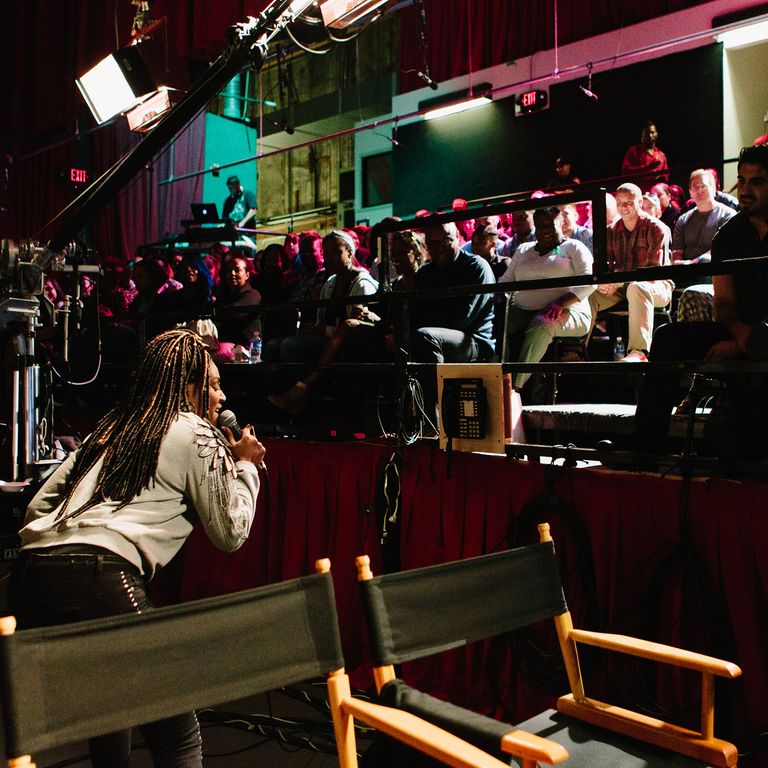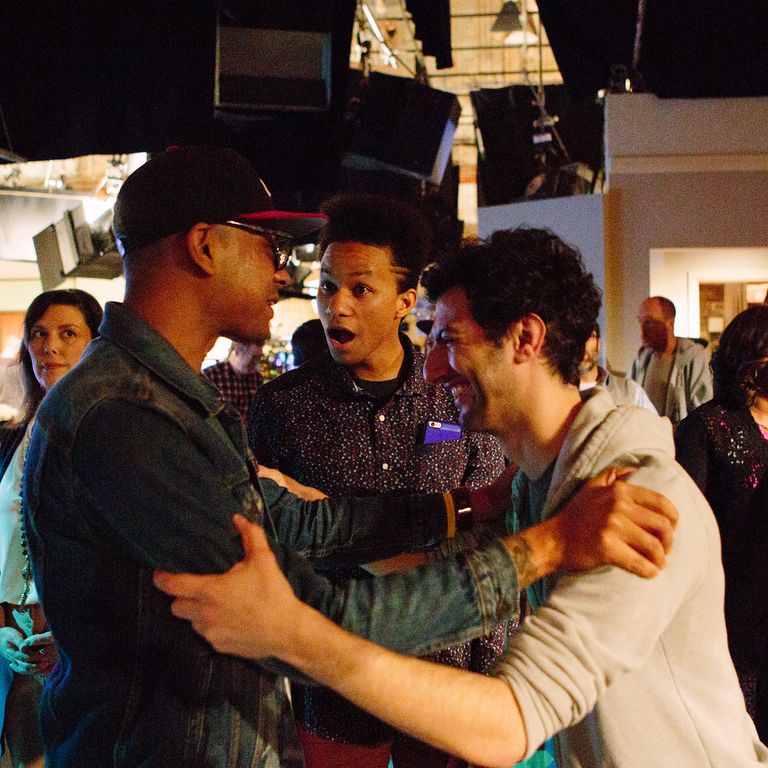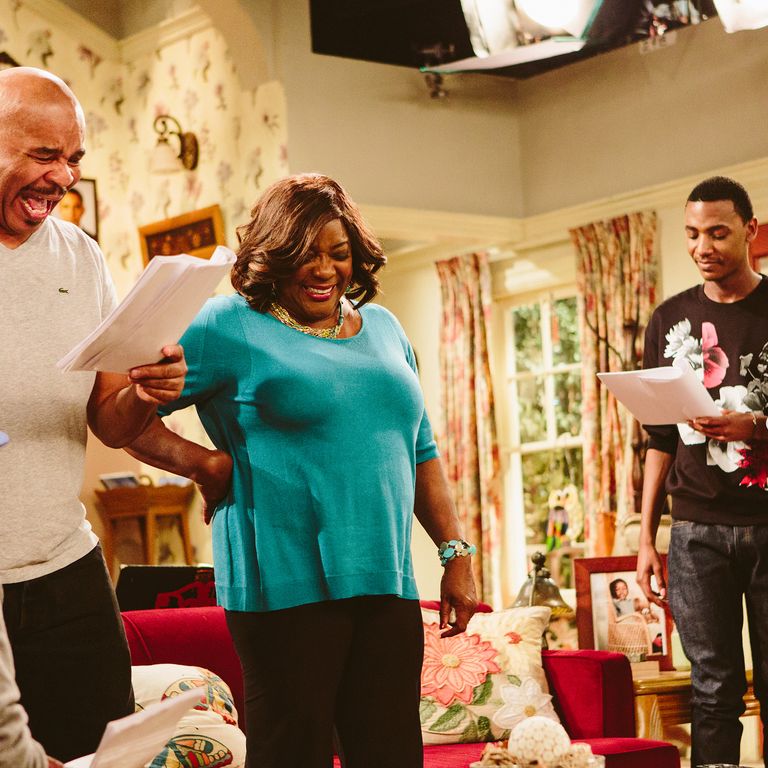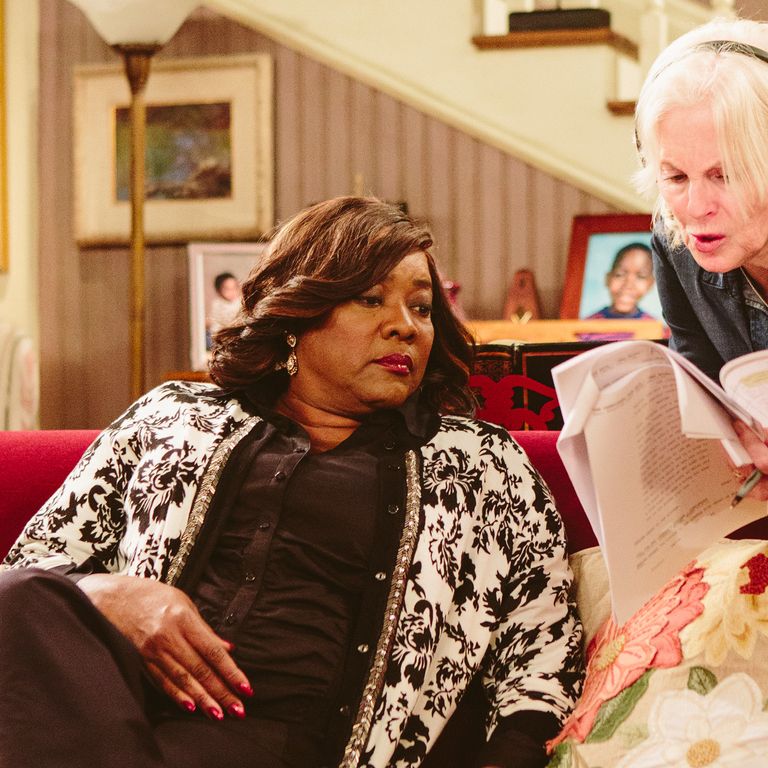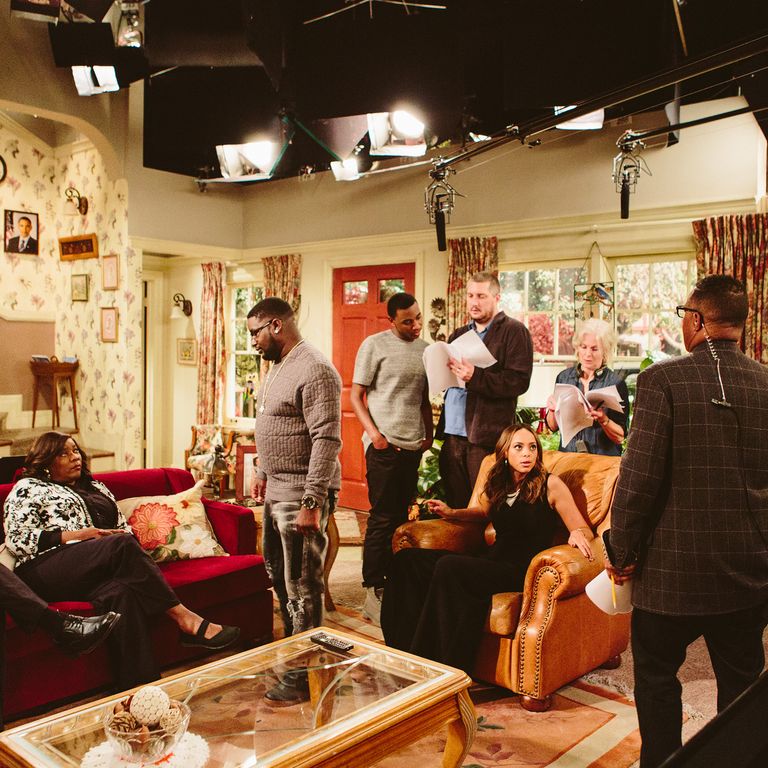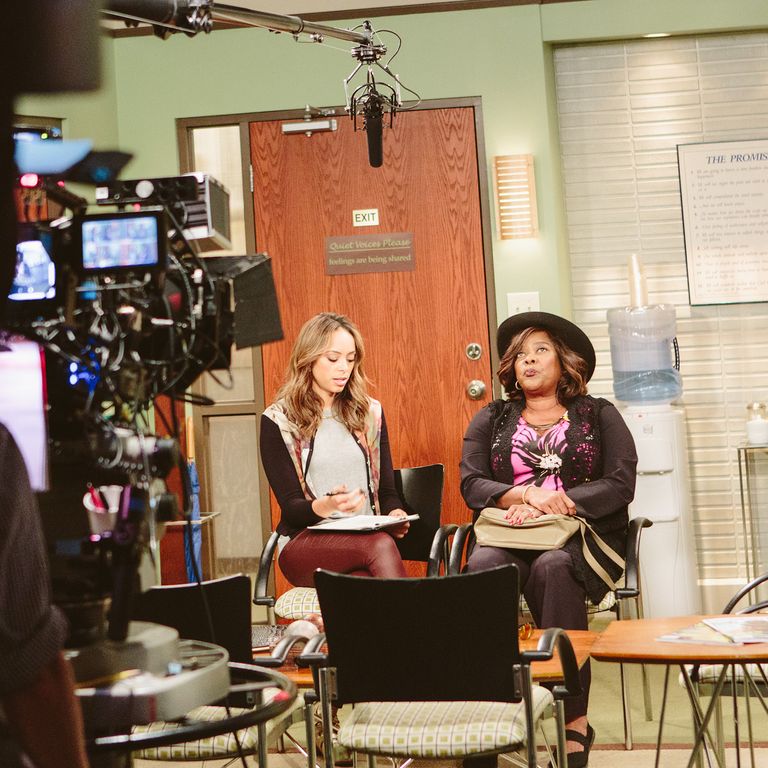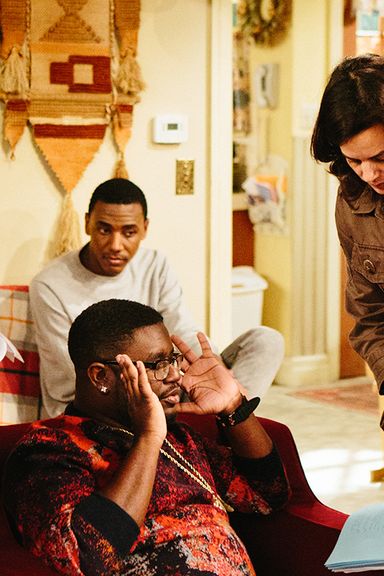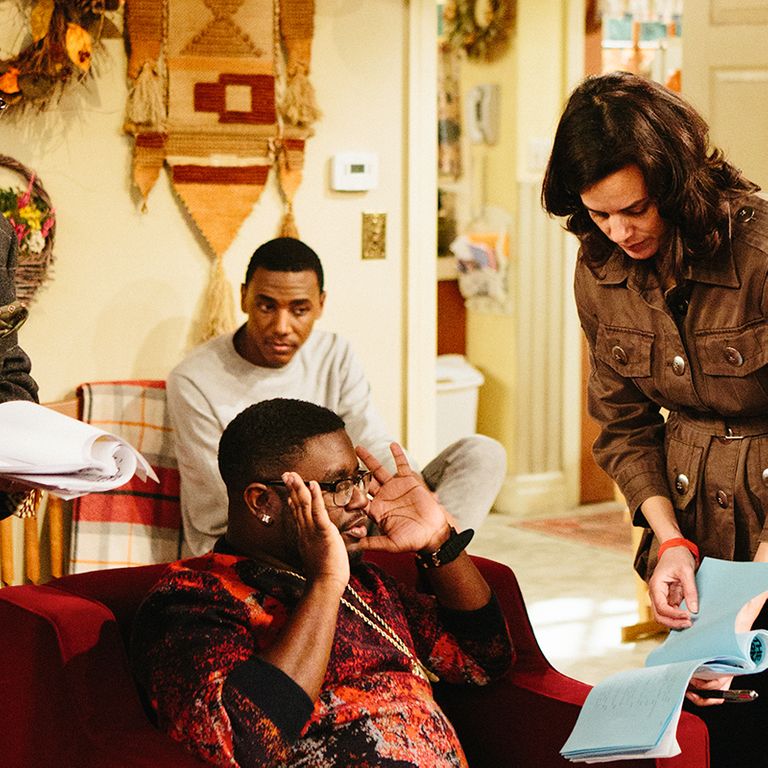The Making of The Carmichael Show’s ‘The Blues’
Jerrod Carmichael left a March afternoon’s table read in Los Angeles for his NBC comedy, The Carmichael Show, feeling like “The Blues,” an episode focused on depression, wasn’t quite living up to its name. The next morning in the shower, he realized a way in: Cynthia, mother to the Carmichael clan, would be crying in the show’s opening scene.
Carmichael, the show’s co-creator, star, and executive producer, jotted the idea down on the dry-erase board he keeps hanging in his shower, and texted showrunner Danielle Sanchez-Witzel as soon as he left the bathroom. At a run-through a few days later for the episode, which aired Sunday night, network and studio executives watched Emmy winner Loretta Devine, who plays Cynthia, weep as she ironed clothes. They looked uncertainly to producers: But will people still laugh?
“Full disclosure: The network was nervous about it, even in editing,” Carmichael said, explaining the hesitation to open a comedy with such a dramatic moment. “But it was the thing I cared about most in the episode. I refuse to do the episode any other way. And they respect that. I think the general audience can handle it and they’re not afraid of real emotion. Television has been more afraid of giving it to them than they’ve been hesitant to receive it.”
Indeed, regular viewers of The Carmichael Show know its throwback-yet-contemporary appeal lies in the way it smoothly navigates topical issues from the perspective of a tight-knit black family. This season alone, the show has tackled death, Islamophobia, abortion, gentrification, and Bill Cosby. In future episodes, the Carmichaels will confront their feelings about social media and the presidential election.
The Carmichael Show family includes Carmichael as the son, Jerrod, and David Alan Grier and Devine as his mother and father, Cynthia and Joe; Lil Rel Howery plays Jerrod’s brother, Bobby; Amber Stevens West is Jerrod’s girlfriend, Maxine; and Tiffany Haddish plays Nekeisha, Bobby’s ex-wife. The show is Carmichael’s second attempt at developing a sitcom for NBC. The first centered on a group of young friends, but it lacked the stand-up comedian’s piercing point of view, according to Carmichael co-creator Nick Stoller, who cast Carmichael in Neighbors and later offered to work with him on a new pilot. From the start, Stoller believed the show should center on a family because of the unique way parents and children can challenge each other.
“I’ve been interested for a long time in a show that talked about current events and social issues, like All in the Family and a lot of the sitcoms of the ’70s,” Stoller said. “Basically, that’s been entirely occupied by The Daily Show, which does a very good job, but there’s a different thing that happens when you have characters you identify with talking about stuff. Jerrod and I have a similar worldview, where there is both cynicism and idealism.”
The goal, Carmichael says, is to be as honest as possible every week. “Whatever we’re doing,” he explained, “I’m always moving closer toward that truth.”
The road to the truth is a long and grueling one, lined with many revisions. Vulture spent a week behind the scenes of The Carmichael Show observing the writing and production behind “The Blues” to see how they got there.
Before the Script: Working-Class Depression
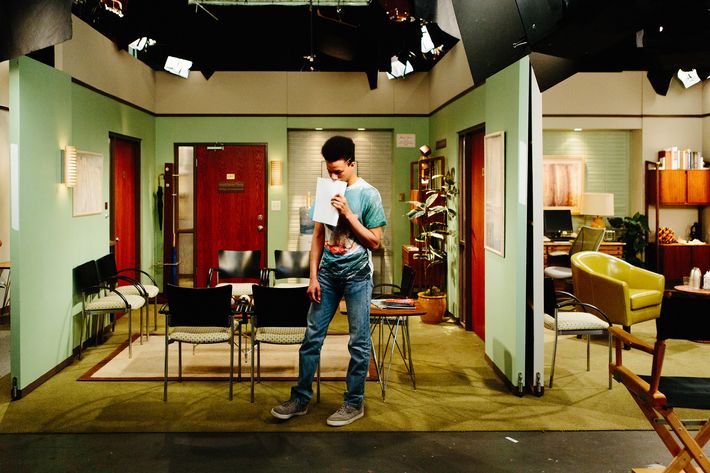
There are seven full-time male writers and three full-time female writers on staff at The Carmichael Show, including co-creators Willie Hunter and Ari Katcher. The room they work in is your typical writers’ workshop, littered with toys (bobble heads, Play-Doh, a Rubik’s Cube) and snacks (barbecue hot Funyuns, cheddar-sour-cream Ruffles, and orange Cuties), the walls plastered with dry-erase boards. Before stories are broken and outlined, the writers, three of whom are black, talk about their personal lives, interests, and what’s currently happening in the news and popular culture. Last fall, Hunter shared with the group that he had started therapy to deal with his life-long depression. Growing up in Heflin, Alabama, in a community that doesn’t acknowledge mental-health issues, the 29-year-old said he had learned “you just suck it up and you move on.”
“When I started talking about it openly, I realized everyone had gone through it or could relate,” said Hunter, who is one of Carmichael’s best friends. “But why are we all so secretive about it? Danielle thought it would make for a great episode. All of us in the room broke it down, and I got assigned the script. It was therapeutic for me to write it.”
Like Hunter, Carmichael, 29, grew up in the South, in a culture that tends to deny ailments like depression. For most of his life, Carmichael says, he wouldn’t have even thought of therapy to solve a problem, and while he’s more open to it now, he’d rather use his art to work out any issues. “I’m not really a therapy guy, but I’ve seen people deal with these real mental issues,” he explained. “I tried it once after I moved to L.A. just to see what all my friends were talking about. I like to figure things out for myself, but if anything ever becomes overwhelming, absolutely I’d try it.”
Hunter and Carmichael’s differing perspectives on therapy helped them arrive at the views expressed in the episode, which explores how the Carmichaels were raised in an environment where it’s taboo to treat depression as a legitimate problem. As Cynthia puts it in “The Blues”: “Working-class people don’t get depression. Depression is a luxury of wealth and free time.”
“With older generations especially, there’s such a stigma attached to it,” said Katcher. “I remember I grew up across the street from this kid who in hindsight clearly was really depressed. His parents called him ‘Grumpy.’ It was a joke in the house.”
Cold Open: The Tears
By the time the cast gathered for the table read on March 11, the script had gone through three rewrites. In an early version of the opening presented to the actors, network, and studio executives, the family returns from the mall to find Cynthia smoking in the bathroom.
“When you first get the script, it gives you an idea of what the overall piece is going to be,” said Devine of receiving the first lines for her character, which would eventually change. “You then have to memorize four or five scripts, really, because sometimes passages stay in, but in different positions.”
Something about Cynthia’s smoking was bothering everyone. “Using the cigarettes had some positive metaphors for us, but it was making things too confusing,” Sanchez-Witzel said. “Is she trying to quit smoking, or is she suffering from depression?”
That evening, as the rest of the writers worked late into the night on other sections of the script, Carmichael and Katcher retreated to Carmichael’s house to try to crack the cold open. “It just wasn’t clicking,” said Katcher, who is also a close friend of Carmichael’s. “Then Saturday he called me early in the morning and was like, ‘She’s crying!’ Any time it’s anti-comedy, that’s a challenge we like.”
Hunter admits the idea made him nervous. “My name was on the script. I didn’t want to be the guy that ruined the show,” he said. “But then I thought about our funeral episode.” In season two’s third episode, “The Funeral,” Joe’s abusive father passes away. “David had a very serious moment, and we fell in love with that realness. We want to do that with every episode.”
In their first attempt to incorporate the tears, Cynthia breaks down while baking Jerrod’s favorite pie, and the family grows concerned. But the setup didn’t resonate the way writers hoped. “The pies didn’t have a purpose, so that fell off,” Carmichael said. The writers worked until nearly 3 a.m. looking for a better entry point. (Carmichael, it should be noted, says he’s “good” with three hours of sleep a night. “I’m really into REM cycles,” he said. “It could all be placebo, mind you, but if it’s an interval of 90 minutes, I’m great.”)
When the writers call it a night is when Devine’s work begins. She likes to wake up in the middle of the night when the revisions are emailed out. “I read it and panic, trying to figure out what’s new that I have to learn. I want to make sure I’m on top of it and it’s not on top of me,” she explained. “You have to make your choice of how you want to deliver it and how you want things to land. So I usually get up and work on it for like an hour, and then I get to sleep. When I get to work, I’m clear on what I want to bring to it so when the director makes his choices, I can either fight for mine or go with his.”
In this draft, Cynthia is crying while she irons a blouse in the kitchen, while the rest of the family waits in the living room to go to Sears for a family portrait. (Unlike baking a pie, the blouse is what Cynthia will be wearing for the portrait, so it works in seamlessly with the rest of the episode.) The plot kicks into motion when Maxine walks into the kitchen to find Cynthia crying.
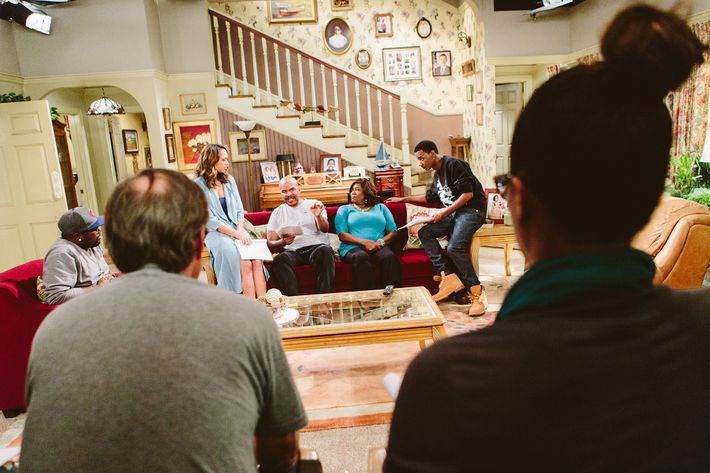
At the March 15 run-through with studio and network execs, the producers liked Devine’s performance. But as compelling as she was, executives weren’t convinced a serious opening was the best way to go, Sanchez-Witzel tells the writers afterward when they retreat to their office.
“Get them the fuck off our backs,” Carmichael replies matter-of-factly as the group hashes out next steps, then catching himself. “I’m sorry. That’s how I respond to notes.”
“It may be we don’t see eye to eye on starting this so dark,” Sanchez-Witzel says, “but I think it works.”
“I don’t even want to pretend we’re shooting an [alternative],” Carmichael continues. “It’s the most important part of the episode.”
Sanchez-Witzel considers this for a moment. “We’ve got to make sure we land the funny [moment] right after,” she says. “Once Maxine discovers her in tears, Cynthia has to pull it together and be super fun in the living room with the rest of the family.”
The next day, Carmichael isn’t worried about it. “Loretta can cry and make you laugh in the next second,” he says, “while there are still tears.” The writers will continue trying to hit that funny note well into tape night.
Act One: Jerrod’s Point of View
What does Jerrod think? This is the toughest question the writers, including Carmichael, face every week. There’s Character Jerrod and Real-Life Jerrod, and the two are not always of one mind. When it came to the question of therapy, things got as complicated as Carmichael’s own opinions on the subject. In early versions of the script, Character Jerrod is dismissive about whether his mother needs therapy. “Going to therapy seems kinda weak,” he says. “Something about it seems like you’re admitting defeat.”
In a later revision, Joe joins their conversation as the foil, and while Jerrod is still not fully committed to the idea, either, he eventually agrees with his girlfriend, Maxine, that Cynthia needs professional help. Something felt off to the writers, so Carmichael took that section to his office to work it out with Katcher. “This usually involves a lot of pacing around and being weird,” Carmichael said. “Sometimes we’ll write something and then write the opposite until we get it. You think about what’s honest, what works, what fits.”
“Sometimes we don’t write anything for like nine hours,” Katcher added. “We jot little things down, but we don’t start writing till like 11 p.m. It’s not healthy at all. We were wondering why we were having such a tough time writing for Maxine and Jerrod in that moment.” When Sanchez-Witzel joined them, they realized why: “It was because there was no conflict. It was just a boring scene until Joe came in.”
On the show, Jerrod’s opinions have veered a lot from his upbringing, so it made more sense that in this case, he would agree with Maxine — who is a therapist — from the beginning, Sanchez-Witzel concluded. In the final version, Joe never agrees with Jerrod and Maxine, but he doesn’t stand in the way of Cynthia making her own choice.
As for Real-Life Jerrod, his own views are more in line with Character Jerrod than they used to be. “I don’t have a girlfriend, but I have grown from where I was seven or eight years ago where I would have been more cold and dismissive of going to therapy. Like anything, you have ignorance when you lack experience and perspective,” he explained. “So the evolution of what you’re seeing in the script is getting closer to my truth now. It’s Maxine in the series, but in my real life, it was my move to Los Angeles. I think everybody needs some form of therapy. Maybe it’s not the traditional couch and note pad. I have artistic outlets; some people have that healthy relationship where they can be completely themselves and open. We try to track that same realization in the show.”
Act Two: Wendy’s
“I’m a grown woman and I don’t know what I like at Wendy’s!”
Cynthia’s hilarious emotional breakthrough — an existential crisis about what to order at Wendy’s — didn’t come easy. In subtle ways, Cynthia’s explanation for her blues was coming across as too self-aware. In the draft where she bakes pies, Cynthia uses them to explain her dilemma: “So what is this pie, Maxine? Is it my world? Sheltering, feeding my family. Is this pie my whole purpose in life as a wife and a mother? Because if it is, I have no idea where I am in it.”
In the version at the run-through, Cynthia says: “Sometimes I’m lost in my family! Do I not have my own identity? There I am in the center of this picture surrounded by a needy family in matching outfits and I just disappear.”
“The network’s biggest note is that this is feeling a little general for Cynthia,” Sanchez-Witzel tells the writers, back at the room. “Sure, a woman could say that, but would Cynthia Carmichael? We need this language to be more real to what her life has been like lately.”
As the writers plunged deeper into Cynthia’s psyche, co-producer Aeysha Carr told a story of the time her mother became frustrated at a drive-through because she never ordered her own meals and instead ate her children’s leftovers.
Carmichael really responded to the idea. “A lot of moms take care of their families through a menu, through food. It’s 90 percent of the reason we’re at the parents’ house so much — we’re just always eating,” he said. “It’s such an important part of our lives and relating it to that gives it a real strong connection.”
“Moms can lose themselves in their families, especially moms that are as wonderful as Cynthia,” Sanchez-Witzel added. Devine thought using Wendy’s was a “brilliant” way for Cynthia to express what she’d been keeping inside, and decided to pack it with as much emotion as possible. But during rehearsals, executives grew concerned the show was taking too sad a turn again, and Devine was asked to perform it with a lighter touch.
“I thought that was the joke, and when you put the emotion on top of it, it was even funnier,” Devine said. “But they said they were getting too sad for her, and I was like, Okay, I don’t know. I thought it touched on the way women really feel but don’t get a chance to say aloud. I wanted women to say, ‘Whoa, Jesus, that’s it.’”
The network really didn’t need to worry about depressing viewers. Joe’s heavy reaction to Cynthia’s revelation sold the whole bit: “This is the saddest thing I ever heard in my life,” he booms in the final script. “This woman just said she don’t know how to order from Wendy’s! You know, you really can’t go wrong with anything on that value menu, baby.”
Meanwhile, Cynthia’s big exit, when she leaves for Wendy’s to “order everything on that menu until I figure out what Cynthia likes to eat,” is a victory for both the Carmichael matriarch and the writers.
“That was a big swing, and we’re never sure how it’s going to land until we see the actors perform it,” Sanchez-Witzel said. “It really felt like what Cynthia meant there at the end was that she’s going to look out for herself and take care of herself. We were very happy with that.”
The Tag: The Therapy Session
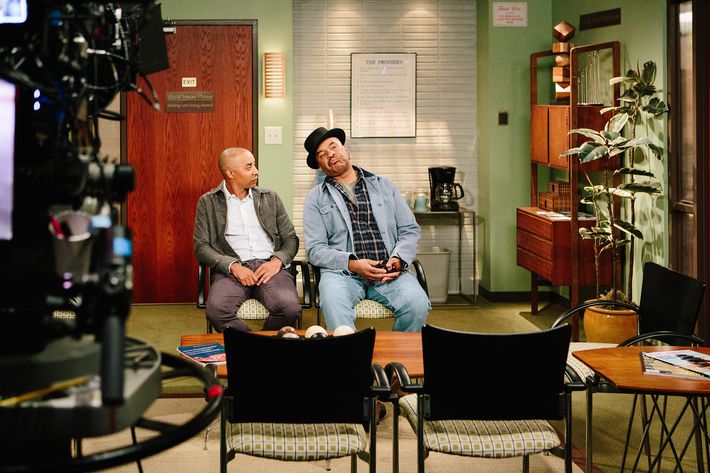
Even the last minute of a sitcom can go through several iterations. Known as the “tag,” it’s designed to give viewers one last laugh. In one version, Jerrod goes home flustered and takes up smoking after his mother confesses she had once miscarried a girl and thought her soul ended up in Jerrod’s body, explaining why his hands are so small and why he’s bad at sports. In another draft — which was actually taped — Joe accompanies Cynthia to the therapist’s office disguised as Heisenberg from Breaking Bad so no one will recognize him. Cynthia, meanwhile, is so happy to be getting things off her chest that she can’t stop blabbing about smoking through her pregnancies.
In the end, the Heisenberg bit is removed, but viewers get a snippet of Cynthia’s therapy session. Carmichael felt the longer version detracted from the strength of the episode.
“It was funny, but sometimes if something is too silly — and I will write silly things — I’m like, Eh, I’m good,” Carmichael said. “I like real things. I like things that have tension. Her pouring her heart out was the most tension we could have, so why would we cut away from that?”
Tape Night: March 17, 2016
The Carmichael Show is taped twice in the same night in front of two different audiences. For the early show at 4 p.m., the cast runs through the entire episode even if the actors haven’t quite mastered their lines, the dialogue is rough, or scenes have holes. During the 7 p.m. show, they slow it down, experimenting with new lines and doing different takes of various scenes so they have options in the editing room.
Because it takes about four hours all told, the audience is fed (Subway sandwiches this time) and a warm-up guy leads them through games and karaoke of popular TV theme songs.
“The four o’clock’s almost like a dress rehearsal,” said Devine. “Once we get through that, we’re pretty sure we can nail anything. Often there are changes that come between the two shows, and that’s when it really gets hectic.”
During season one’s “Prayer” episode, for example, the writers rewrote almost the entire final scene in the hour between the two tapings, Sanchez-Witzel said. It’s normally not as drastic as that, though new jokes usually emerge, and moments may be cut or added.
“You have to learn not to get too precious about things because sometimes what’s funny on the page is not funny onstage,” she said. “Or the reverse happens and an actor spins something we didn’t think was a joke and it’s like, Oh, it is a joke, we’re so smart!”
On this night, Sanchez-Witzel triumphantly announces before the start of the second taping, “No new pages!” It’s a relief for the actors, but that doesn’t mean there won’t be in-the-moment tweaks. Carmichael, who takes part in both coming up with new jokes and performing them, finds that last-minute back-and-forth energizing.
“It’s always fun to switch things up, to find stuff on the spot, to give the audience a fresh experience,” Carmichael said. “It’s really fun when the cast finds something in the moment and when a mistake turns into something great. Sometimes you have to see beyond it and know when something is funny, even if the first audience didn’t necessarily laugh. I’ve been doing stand-up a number of years, and I’m used to trusting myself.”
When the cameras roll, Devine begins crying quietly. The first run of the cold open goes smoothly, but the writers huddle to punch up some moments. Maxine’s exit line from the living room isn’t working for them. As written, Joe asks her to grab a stepladder so he can practice doing a pyramid pose with his sons for the family portrait, and she replies: “Yeah, because that’s what this situation needs. Something to make it more dangerous.”
The writers ask Stevens West to try out a new line — “This will be fun! I was head cheerleader, so I can be on top” — and give Grier a new punch line: “Your mom ain’t gonna let her be on top.” The audience cracks up, and this version makes the final edit.
Mindful that they need the ending of the cold open to be as uplifting as possible, the writers brainstorm new lines during the 7 p.m. taping for Cynthia and Maxine, who catches Cynthia crying in the kitchen. In the shooting script, Cynthia, worried that Maxine will tell the family, says, “You’re giving me snitch vibes right now, Maxine. Now, who do you think they’re going to believe if you try to tell them I was crying? Me, the mother who gave them life? Or you, the new girl?”
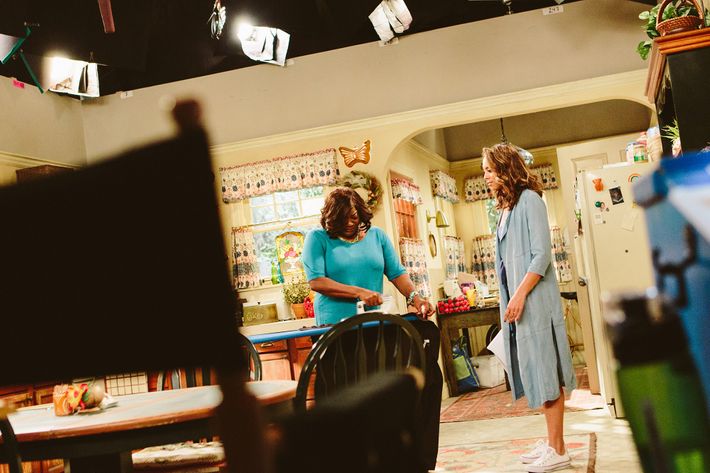
The writers, feeling they could improve on this exchange, came up with a new one on the spot:
Cynthia: You know what, Maxine? I’m getting a snitch vibe from you. You know what happens to snitches?
Maxine: Get stitches?
Cynthia: No, they get dead!
Cynthia then swings the kitchen door open and yells “Picture time!” with a big smile on her face. The audience howls over the new lines. “That’s great!” Sanchez-Witzel says to other producers. Devine nailed it, hitting the funny note they’d been seeking.
Another tweak is made in a later kitchen scene, when Jerrod and Joe discuss whether Cynthia needs professional help. Joe argues that feeling a little sadness can be healthy: “It’s like what Jennifer Lawrence said in American Hustle. Every perfume’s gotta have a little whiff of death in it.”
The producers want to try something else. Variations of an Amy Winehouse joke, uttered by different characters in revisions throughout the week, makes its way back in. Joe goes again: “There’s nothing wrong with being sad sometimes. Look at Amy Winehouse. Beautiful music!” Jerrod responds: “She’s dead. And I want Mom to be okay.”
This makes it into the final cut. “It’s always good to have that extra stuff in your head to layer the story and fill it out,” Sanchez-Witzel said.
The show wraps, and Carmichael steps center stage to thank the audience. The next day is the table read for an upcoming episode, “Facebook Friends,” the Carmichaels’ take on social media: Joe joins Facebook and is proud of how quickly he amasses 54 friends; Cynthia gets jealous. For “Facebook Friends,” as with “The Blues,” the goal for Carmichael remains challenging in its simplicity: “It’s really important with this show that I do not lie artistically.”
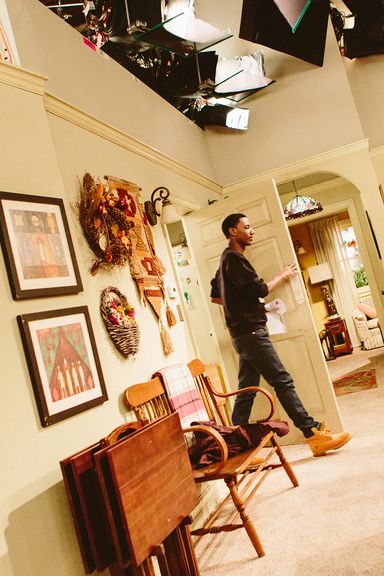
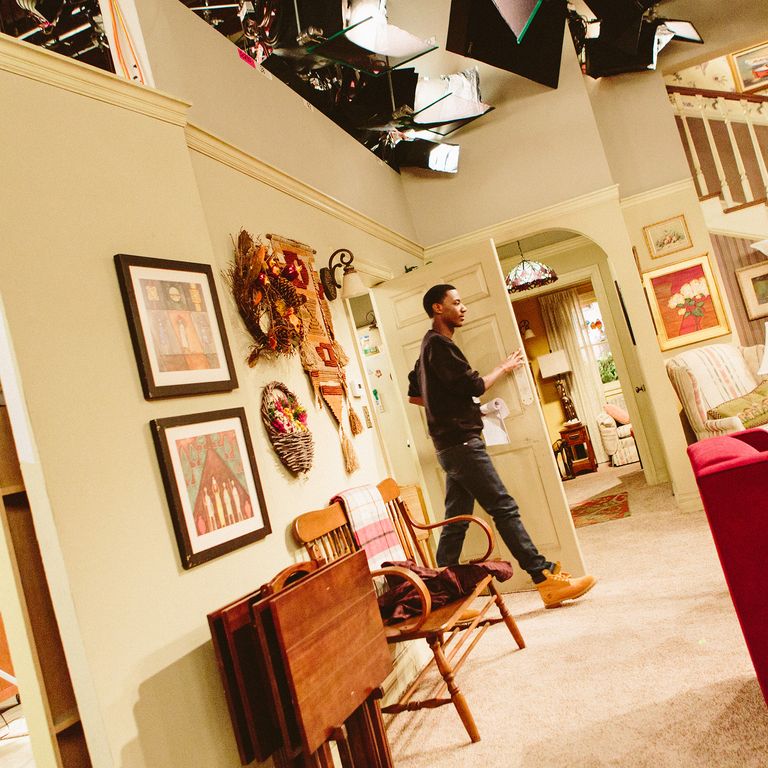
Star, executive producer, and co-creator Jerrod Carmichael walks out of the Carmichael house kitchen.
Photo: Jonathan Snyder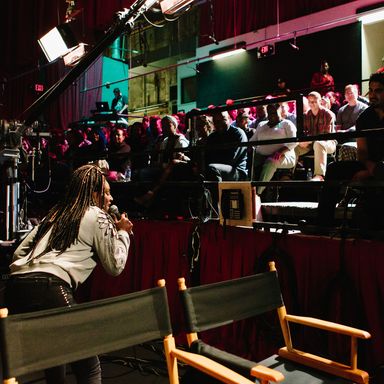
Carmichael Show co-star Tiffany Haddish entertains the audience with a karaoke version of Tina Turner’s “Proud Mary.”
Photo: Jonathan Snyder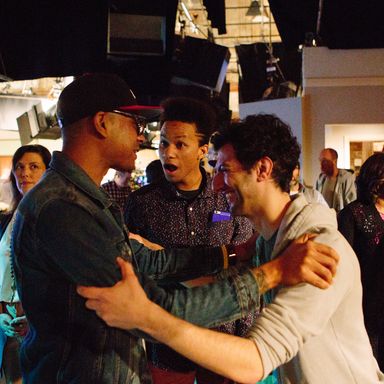
Co-creators Willie Hunter (center) and Ari Katcher (right) congratulate story editor Yassir Lester on landing a role on a Fox comedy pilot. The three ...
Co-creators Willie Hunter (center) and Ari Katcher (right) congratulate story editor Yassir Lester on landing a role on a Fox comedy pilot. The three stand-up comics are Carmichael’s close friends.
Photo: Jonathan Snyder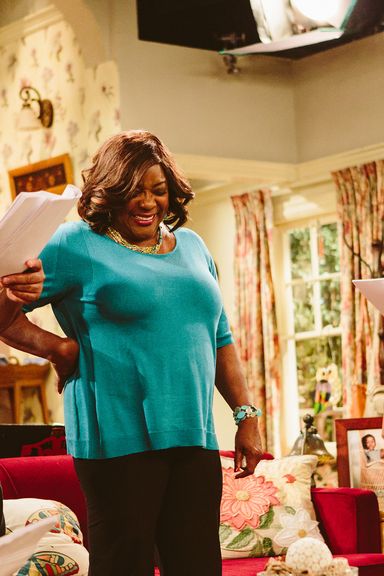
Devine rehearses a scene in which the Carmichaels find the idea of therapy hilarious.
Photo: Jonathan Snyder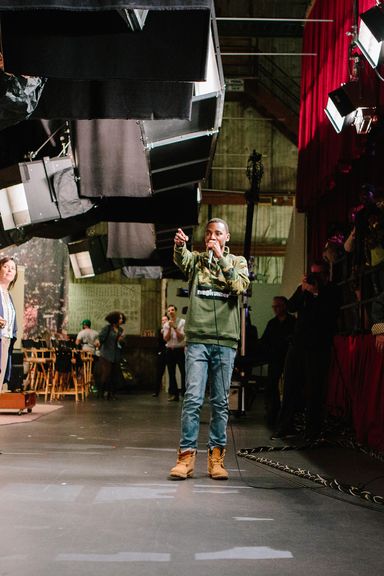
When the episode wraps, Carmichael gives a shout-out to the cast and thanks the audience.
Photo: Jonathan Snyder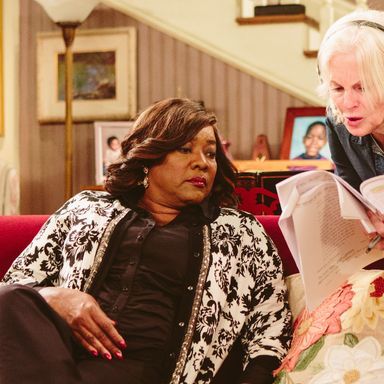
On tape night, Devine goes over her lines with script supervisor Maureen Tenenbaum.
Photo: Jonathan Snyder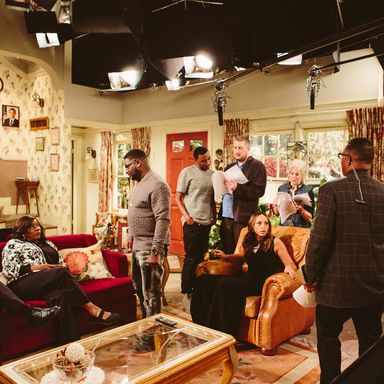
Between takes on tape night, co-exec producer Hunter Covington and script supervisor Maureen Tenenbaum review lines with Jerrod Carmichael, while firs...
Between takes on tape night, co-exec producer Hunter Covington and script supervisor Maureen Tenenbaum review lines with Jerrod Carmichael, while first assistant director Rusty Colemon chats with Amber Stevens West.
Photo: Jonathan Snyder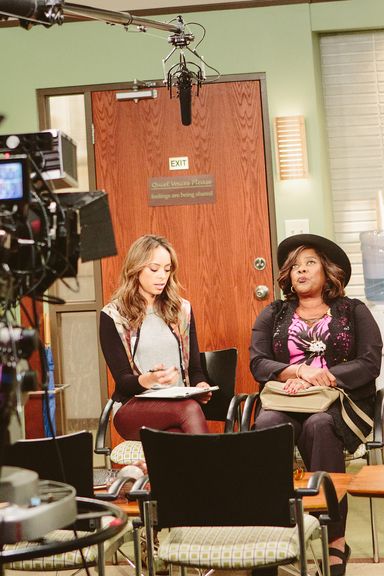
Stevens West and Devine shoot the scene where Cynthia first visits a therapist.
Photo: Jonathan SnyderExecutive producer Danielle Sanchez-Witzel goes over new lines with Lil Rel Howery.
